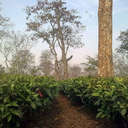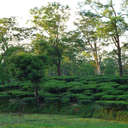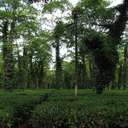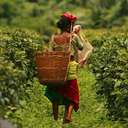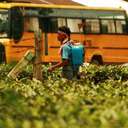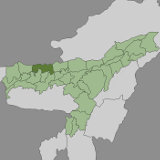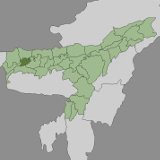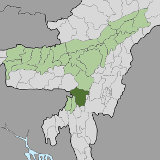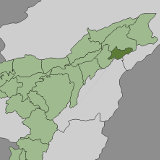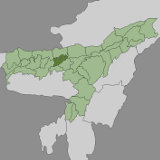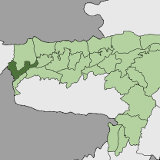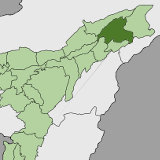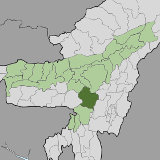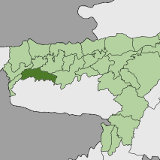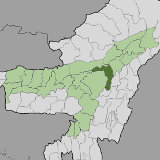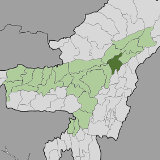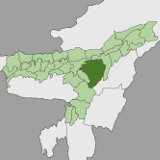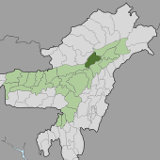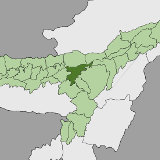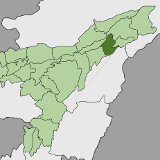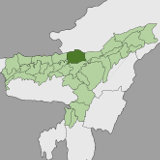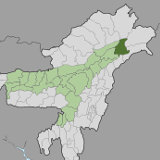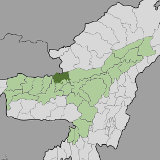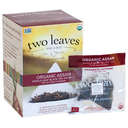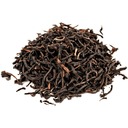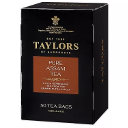Assam, India
Wikipedia: Assam | Official Government Website: assam.gov.inUpdated: Jan. 2, 2018
Table of contents:
About Assam, India | Tea-Producing Regions of Assam, India | Styles of Tea Produced in Assam, India | Best (Top-Rated) Assam Teas
About Assam, India | Tea-Producing Regions of Assam, India | Styles of Tea Produced in Assam, India | Best (Top-Rated) Assam Teas
About Assam, India
Clickable map of Assam; districts for which we have single-origin teas listed and/or dedicated pages are highlighted in green. This map is our original work, © All Rights Reserved.
Assam is a region of India famous for its black teas. As of 2008, Assam accounted for about 55% of India's tea production.[1] Assam produces only a tiny portion of green and white teas--a lower proportion even than a number of other regions that have historically only produced black tea, although production of these teas has increased in recent years.Most Assam teas are produced from the Assamica cultivar of tea plant, contrasting with teas from the Darjeeling district. The Assamica cultivar has larger leaves, relative to the smaller-leafed variety used in most Darjeeling and also most Chinese black teas. The same cultivar used in Assam tea is also grown in other regions, especially in lowland regions, including Thailand.
Assam has had a problem with militants; in 2001, according to the chief of police in Assam, most funding for the groups had been cut off, but the tea industry was the single remaining source of funding for the militant groups. In the past, cities and towns had faced extortion by these groups.[2]
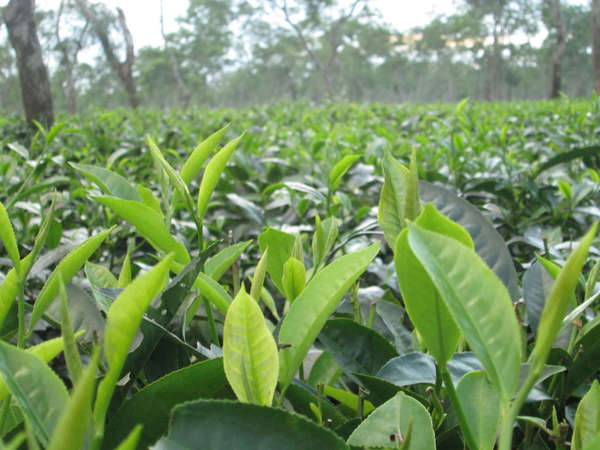 Closeup of Tea Leaves, Jorhat, Assam, India. Note the large leaf size. Photo © Bidyut Gogoi (Flickr), CC BY 2.0.
Closeup of Tea Leaves, Jorhat, Assam, India. Note the large leaf size. Photo © Bidyut Gogoi (Flickr), CC BY 2.0.Geography And Regions of Assam
Assam and the surrounding areas are geographically isolated from the rest of India. The state has an area of about 30,285 sq mi (78,438 sq km), roughly the size of Maine, South Carolina, the Czech republic, or Austria.While the state looks unusually-shaped on the map, its borders closely follow the geographic booundary between lowland areas surrounding the Bramaputra river and its tributaries, and upland regions, more hilly and mountainous, which are part of other Indian states or Bhutan. There are a few exceptions of hilly, upland regions at the margins of Assam, or odd bits of uplands surrounded by lowlands.
The geographic continuity ends, however, at the lower end of Assam, as the Brahmaputra curves south and enters Bangladesh.
Climate, geography, and ecology
Most of Assam has a humid subtropical climate, tending towards the warmest end of this climate type, making it similar to a fully tropical climate. Although winters are slightly cooler, frost is rare, with milder parts of the region never having recorded a frost. Although humidity is high year-round, there is a distinct monsoon season in the summer and a dry season in the winter, following the pattern of the Asian monsoon.Regional variation in climate is subtle; upland areas are slightly cooler year-round and more likely to experience the occasional frost, but are still solidly subtropical.
Assam experiences frequent and often severe flooding of the Brahmaputra river and its tributaries.
Assam is one of the areas of the world richest in biodiversity; it contains rainforests, deciduous forests, and extensive wetlands. The tropical lowland forests have been reduced to a tiny portion of their original extent, but there are numerous parks, wildlife refuges, and protected wild areas. Upland forests in the region are relatively more intact.
Districts and Subdivisions
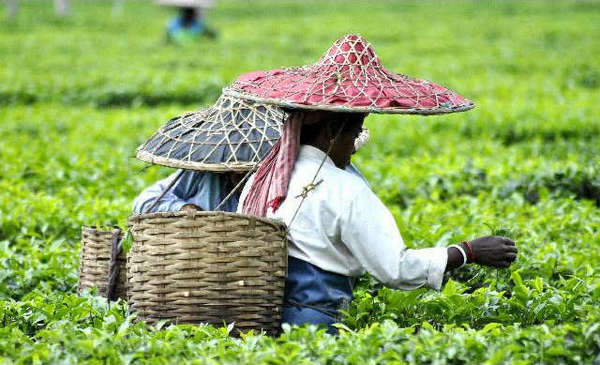 Tea Pickers near Margherita, Tinsukia. This region is considered part of Upper Assam. Photo © Arun Bharali (Flickr), CC BY 2.0.
Tea Pickers near Margherita, Tinsukia. This region is considered part of Upper Assam. Photo © Arun Bharali (Flickr), CC BY 2.0.Most of the tea grown in Assam is grown at a low altitude, giving it a distinctly different character from the tea grown in Darjeeling and other high-altitude regions. One notable exception is Kopili estate, located in Dima Hasao. There are also higher-altitude regions in Karbi Anglong, and at the margins of various other districts at the border with Arunachal, Bhutan, and other more mountainous regions.
References:
1. Floods ravage India's northeast, thousands homeless, Reuters India, Jun 17, 2008.
2. 'Tea companies still financing militants' , The Hindu, Mar. 18, 2001.
Tea-Producing Regions of Assam, India
Styles of Tea Produced in Assam, India
This is a selection, not an exhaustive listing, of the styles of tea most commonly produced in Assam, India.
Best Assam Teas
The notion of the "best" Assam teas is subjective, because different people have different tastes. We present the most often-rated and highest-rated teas produced in Assam, India, and allow you to draw your own conclusions.
Most Often-Rated Teas
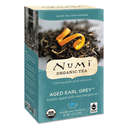
Aged Earl Grey™ - Bergamot Black
| Brand: | Numi Organic Tea |
| Style: | Earl Grey Tea |
| Caffeine: | Caffeinated |
| Leaf: | Teabag |
60
11 Ratings

Mtn High Chai
| Brand: | Two Leaves and a Bud |
| Style: | Chai / Spiced Tea |
| Caffeine: | Caffeinated |
| Leaf: | Sachet |
33
10 Ratings
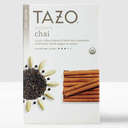
Chai Classic (Formerly Organic Tazo Chai)
| Brand: | Tazo Tea |
| Style: | Chai / Spiced Tea |
| Caffeine: | Caffeinated |
| Leaf: | Teabag |
30
9 Ratings

Golden Chai™ - Spiced Assam Black Tea
| Brand: | Numi Organic Tea |
| Style: | Chai / Spiced Tea |
| Caffeine: | Caffeinated |
| Leaf: | Teabag |
39
7 Ratings
Top-Rated Assam Teas

Aged Earl Grey™ - Bergamot Black
| Brand: | Numi Organic Tea |
| Style: | Earl Grey Tea |
| Caffeine: | Caffeinated |
| Leaf: | Teabag |
60
11 Ratings
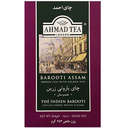
Barooti Assam (Broken Leaf with Golden Tips)
| Brand: | Ahmad Tea |
| Style: | Assam |
| Caffeine: | Caffeinated |
| Leaf: | Loose |
55
4 Ratings



